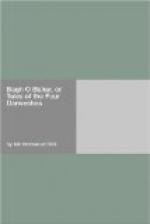[13] A ghat is a long flight of steps, of stone or brick, leading to a river for the purpose of bathing, drawing water, embarking or disembarking. It is a high object of ambition in India, among the wealthier classes of natives, to construct these ghats, and this species of useful ostentation has produced some magnificent structures of the kind on the rivers Ganges, and Jumna, which are of great public utility.
[14] The reader will do well in the first place to pass over this very clumsy parenthesis in the original; and return to it after he has finished the rest of the paragraph.
[15] The Honourable Company’s European servants, civil, military, and medical.
[16] A celebrated Persian poet of Dilli; his odes are very elegant, and have great poetical genius; he was, as a Persian poet, inferior to none: he is the original author of this “Tale of the Four Darwesh.”
[17] The author seems to use Dilli or Dihli indifferently for the northern metropolis of India, vulgarly called Delhi.
[18] Zari Zar-bakhsh means the bestower of gold; Nizamu-d-Din Auliya was a famous holy personage of Upper India, and holds the first rank in the list of the saints of Hindustan. His shrine is at Dilli, and resorted to by thousands of devotees, and many tales are told of his inspired wisdom, his superior beneficence, his contempt of the good things of this world, and his uncommon philanthropy.
[19] The Kos is a measure of distance nearly equal to two English miles, but varying in different provinces.
[20] The Muhammadans, after being cured of sickness or wounds, also their women, after recovery from child-bed, always bathe in luke-warm water; which is called the ablution of cure.
[21] A mere novice in the language would say that Mir Amman writes “bad grammar” here! He uses the singular pronoun “wuh” instead of “we.” Now Mir Amman distinctly tells us that he gives us the language as it is. He did not make it—and, furthermore, nothing is more common among Hindustani writers than to use the singular for the plural, and “vice versa.”—Vide Grammar, page 114.
[22] Mr. Ferdinand Smith adds the following note: “How proud the slave seems of his chains!—but such is the nature of Asiatic minds, under the baneful influence of Asiatic despotism.” Now, this criticism is absurd enough. Have not we in England the titles of “Ladies in waiting,” “Grooms,” &c., innumerable, which honours are borne by our nobility and gentry?
[23] The family of Taimur, or Tamerlane; a pageant of which royal race still sits on the throne of Dilli, under the protection of the British government. He is happier, and has more comforts of life, than his family have had for the last century.
[24] Literally, “why explain that which is self evident” a Persian saying.




